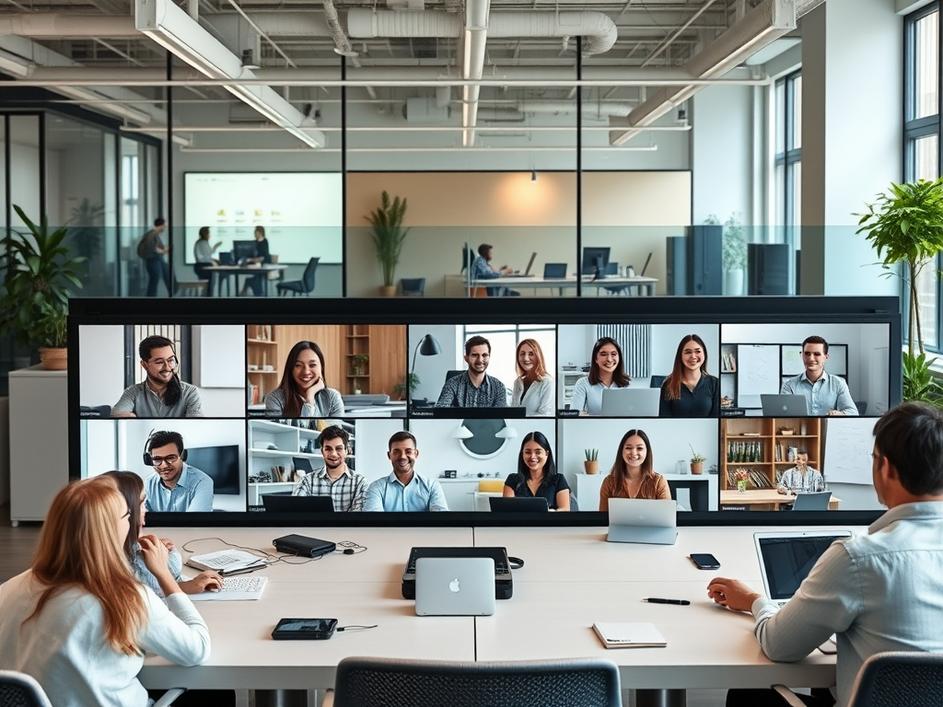


We are a digital agency helping businesses develop immersive, engaging, and user-focused web, app, and software solutions.
2310 Mira Vista Ave
Montrose, CA 91020
2500+ reviews based on client feedback

The way we work is always changing, and right now, we’re seeing a big shift. For a long time, things like leadership, solving problems, and talking well were seen as the most important skills to get ahead. But it looks like a new skill is quickly moving to the top of that list: using artificial intelligence tools. It seems that how you work with AI could now be a major factor in getting promoted or even hired at some of the biggest companies.
This isn’t just about fancy new tech. It’s about a real, practical change in what makes an employee truly valuable. It signals that companies are moving past just talking about AI to actually making it a core part of how they measure success. This trend, starting in places like Amazon, shows that embracing AI isn isn’t just a future idea; it’s what’s happening right now, shaping careers and changing expectations for everyone.
What's Included?
ToggleThere’s a strong signal coming from inside Amazon, one of the world’s largest companies, that things are evolving quickly. A high-ranking executive, Jamie Siminoff, who famously started Ring before Amazon bought it, is now openly sharing his approach. He’s not just checking if employees hit their targets. Instead, he’s paying close attention to how they use AI tools in their daily tasks. In fact, he’s making decisions about who gets hired and who gets promoted based on this very skill.
Think about what that means. Showing you can weave AI into your daily work – making things better, faster, or smarter – is now a direct path to moving up the ladder. This isn’t a theory; it’s a real-world practice happening inside a company that often sets the pace for others. Amazon’s approach usually becomes a blueprint for other businesses. So, what starts there often spreads quickly. This could mean that soon, many more companies will be looking for this exact ability. It’s a clear message: being good at your job isn’t enough anymore; being good at your job with AI is the new standard.
So, why does this matter for you, beyond just following tech news? Simply put, your career might depend on it. Imagine two team members, both doing solid work. One uses AI tools to speed up research, draft initial reports, or analyze data much faster. The other sticks to older methods. Who do you think looks more efficient, more forward-thinking, and more valuable to the company? The answer is pretty clear.
This isn’t just about saving time, though that’s a huge benefit. It’s about showing you can adapt, learn new things, and improve how work gets done. It shows you’re a problem-solver who’s ready to use the best tools available. In today’s tough job market, where every company seeks an advantage, an employee who can make the business smarter and faster through AI is a massive asset. This outlook suggests that if you want to grow, you need to understand and use AI. It strengthens your work, and it makes you a stronger candidate for whatever career steps you want to take next.
Now, before you worry that you need to become a software engineer, let’s clarify something important. Using AI for career growth usually doesn’t mean you have to be an AI developer. For most roles, it means becoming a smart user of AI. This involves learning how to talk to these tools – often called “prompt engineering.” It’s about asking the right questions to get the best results, knowing how to refine your requests, and understanding what AI can and cannot do.
It also means figuring out where AI fits into your daily tasks. Can it help you brainstorm ideas faster? Can it write initial drafts of emails or documents? Can it summarize long articles? Can it help you sort through lots of information? This isn’t about letting AI do your whole job. It’s about making AI your intelligent helper. It asks you to develop a new way of thinking: how do I combine my human judgment with AI’s ability to process information? These are practical skills anyone can start learning today, no matter their job. It’s about being curious and trying out the tools that are available.
Like any major change, this focus on AI-driven promotions comes with its own set of potential difficulties. One big question is about fairness. How do you accurately and consistently measure AI usage across many different roles? What if some jobs naturally lend themselves more to using AI than others? We also need to think about the quality of the work. Just because something was done with AI doesn’t automatically make it good. Relying too much on AI without careful human checking could lead to mistakes, or even a lack of original thought.
There’s also a risk that some employees might feel pushed to use AI, even if it doesn’t truly help their work, just to appear productive. And what about access? Not everyone has the same access to these tools or the training to use them well. Companies need to be thoughtful about how they introduce these new expectations. They must make sure it truly helps employees and the business, rather than just adding new stress or creating an unfair playing field. It’s about finding the right balance between moving forward and making sure everyone has a fair chance.
From my perspective, this shift feels like a natural and unavoidable part of our working future. AI is here to stay, and it’s constantly improving. Companies that thoughtfully use it will likely gain a big advantage. For individuals, ignoring this trend would be a real mistake. It’s not about AI taking your job; it’s about someone who uses AI better than you do taking your job. So, learning to work with AI isn’t just a nice skill to have; it’s becoming a fundamental part of staying competitive in many fields.
However, I believe it’s important that companies don’t just demand AI use, but also offer the right training, resources, and clear guidance. They need to explain what “good AI use” actually means and how it truly adds value, instead of just being another box to tick. And employees need to remember that AI is a tool, not a replacement for human creativity, compassion, or critical thinking. The real strength comes from combining both. We are still the ones in charge, even if some of our tools are now digital. This new era asks us to adapt, but to do so with purpose and a strong sense of human values.
So, what does all this mean for you? It means the future of work isn’t some distant idea; it’s unfolding right now, in real-time, in big companies like Amazon. The way you approach your daily tasks, and whether you include new technologies like AI, could very well be the deciding factor in your career path. This is a call to action, a gentle push to start exploring, trying out, and understanding how these powerful tools can boost your abilities. Don’t wait for your company to tell you to do it; start getting comfortable with AI today. Your next promotion, or even your next job opportunity, might just depend on it. This isn’t a threat; it’s an incredible chance to rethink what it means to be productive, creative, and essential in today’s workplace.



Comments are closed